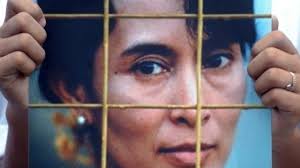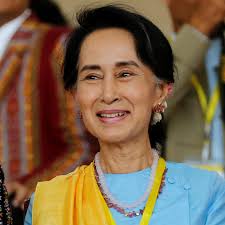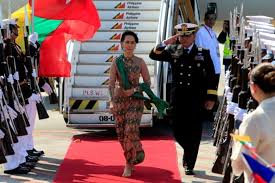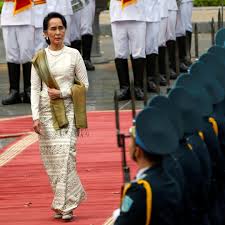Forgotten at 80: Why the World Must Remember Aung San Suu Kyi, and Myanmar’s Broken Promise

On 19 June 2025, Aung San Suu Kyi, once the global symbol of non-violent struggle for democracy marked her 80th birthday inside a prison cell in Myanmar’s junta-run capital, Naypyidaw. The woman who spent decades under house arrest, who won the 1991 Nobel Peace Prize, and who later became Myanmar’s de facto civilian leader, is today a political prisoner serving long sentences on charges widely described as politically motivated. This is not a simple story of one leader’s fall from grace. It is the story of a country that flirted with reform only to be dragged back into brutal military rule, and of an international community that celebrated its heroine in one decade, then largely turned away the next.

Aung San Suu Kyi, whose party had won the November 2020 general election, was arrested on 1 February 2021, after a coup d'état that returned the Tatmadaw to power and sparked protests across the country. The Burmese government detained and kept Aung San Suu Kyi imprisoned because it viewed her as someone "likely to undermine the community peace and stability" of the country, and used both Article 10(a) and 10(b) of the 1975 State Protection Act (granting the government the power to imprison people for up to five years without a trial).
Let us look at the life of Suu Kyi in a quick timeline
From 1988–1991, she had her rise and and won a Nobel Prize: Aung San Suu Kyi rose to prominence during the mass pro-democracy protests of 1988 (the “8888 Uprising”). She spent years under house arrest and was awarded the 1991 Nobel Peace Prize for her non-violent struggle for democracy.
In the 2010s, she had her partial opening, and political leadership: After release, Suu Kyi’s party, the National League for Democracy (NLD), won landmark elections in 2015 and again in 2020; she served as State Counsellor (the de facto leader) from 2016.
In 2017, the Rohingya crisis took place: The military carried out a brutal campaign in Rakhine State that forced hundreds of thousands of Rohingya to flee to Bangladesh. The atrocity prompted global condemnation and complicated Suu Kyi’s international standing after she defended Myanmar’s position at the International Court of Justice in 2019.
2021, a military coup: On 1 February 2021 the military seized power, arrested Suu Kyi and other leaders, and rolled back democratic gains. Since the coup, tens of thousands have been detained, thousands killed, and the country has become an arena of violent conflict.
2023–2025, According to the Reuters Suu Kyi went through trials, long sentences, and solitary detention: Suu Kyi has been tried on multiple counts and given cumulative sentences that could keep her jailed for life; reports and leaked materials according to the Guardian NewsPaper indicate harsh detention conditions and restricted contact with family. Human rights groups warn that her health is deteriorating.

The humanitarian emergency behind the headlines
The junta’s crackdown has not only re-imprisoned leaders, it has produced a full humanitarian and human-rights catastrophe. UN and rights organisations have documented:
Widespread civilian suffering and displacement, echoing the scale of abuses seen in 2017. The UN Human Rights Office reported (September 2025) that “death, destruction and desperation mirror 2017 atrocities.”
Systematic attacks on civilians and infrastructure; Human Rights Watch and Amnesty have detailed “scorched earth” tactics, attacks on villages, schools and hospitals, and arbitrary arrests.
Mass detention: Tens of thousands of political prisoners languish in jails or secret facilities; periodic junta amnesties have freed some prisoners, but many remain detained.
This is a country where entire communities are being displaced, healthcare and food supplies are under strain, and resistance, though resilient, pays a heavy price.
Why global outrage faded, and why that matters
Suu Kyi’s international image changed after 2017. Her reluctance to condemn the military’s actions against the Rohingya at the International Court of Justice damaged the moral clarity many once attached to her leadership. That episode, the media focus on it and this made parts of the West less willing to defend her later, even after she became a victim of junta repression, but there is a crucial distinction to make: the West’s criticism of her handling of the Rohingya does not erase the fact that she is now a prisoner of the same generals who orchestrated mass atrocities. Her detention is part of a broader program of repression by the junta, and the cruelty of that repression demands condemnation on its own terms.
What the evidence says about her detention and condition
Reporting by major outlets, based on leaked footage and prison logs, paints a grim picture: Suu Kyi is held in a secure facility in Naypyidaw, with severe restrictions on visitors and limited medical care; her family’s contact has been sporadic at best. Leaked materials and reporting raise concerns about her physical and mental well-being.
Her son and supporters have repeatedly warned about deteriorating health, and Reuters reported in 2025 that the son had appealed for urgent medical attention for heart problems, a plea that underlines the human stakes of her continued incarceration.
Did the international community do enough?
The record is mixed. Some countries and institutions have imposed targeted sanctions, issued condemnations, and supported humanitarian relief, but many activists and ordinary Myanmar citizens feel global attention has been inconsistent, that it is loud in some moments, quiet in others. The geopolitical reality is also stark: the junta has diplomatic backing and arms from powerful states such as Russia and China, which blunts the effect of Western pressure. Meanwhile, crises in other regions have also diverted attention.
Why Suu Kyi still matters
1. Symbol and catalyst: For many inside Myanmar, Suu Kyi remains a symbol of the long struggle for civilian rule. Her imprisonment parallels the broader subjugation of civil liberties across the country.
2. Human cost of impunity: Her case is a warning that political leaders can be neutralized with impunity, and when the world’s attention shifts, abuses continue unchecked.
3. Catalyst for action: Renewed international focus can translate into meaningful pressure whether it be diplomatic, economic, or humanitarian and this could improve conditions for millions.
How people have tried to keep her voice alive
Even behind bars, Suu Kyi’s supporters organized global acts of solidarity. On her 80th birthday, activists reportedly gathered over 100,000 video greetings in an attempt to set a Guinness World Recordand to shine a light on her plight — a symbolic act meant to remind the world that she remains a prisoner of conscience to many.
Documentaries such as Cancelled (The Independent) and investigative pieces (The Guardian’s leaked footage reporting) have kept the story in public view; these resources are powerful primers for anyone seeking to understand the arc of Suu Kyi’s rise and fall.

A hard truth is that history will judge leaders and movements not only by their triumphs but also by what happens when they are defeated. Aung San Suu Kyi’s imprisonment is not simply an isolated injustice; it is a symptom of Myanmar’s sliding into deeper repression and of a failing international response. Concrete actions the The International Community and individuals who care, can push for: Sustained diplomatic pressure on the junta, coordinated across democratic states (not episodic statements). Targeted sanctions on military leaders and their commercial interests, while protecting humanitarian channels for civilians. Support for humanitarian access to displaced populations and civilians caught in conflict zones, and Continued documentation and reporting of human-rights abuses by independent agencies, so evidence can feed accountability efforts now and in future tribunals.
Aung San Suu Kyi’s fate is entangled with Myanmar’s. Remembering her, and the millions who suffer under the junta is not an act of nostalgia. It is a moral and political imperative to keep pressure on perpetrators, to protect civilians, and to insist that justice, dignity and democratic hope remain more than words on a page.
You may also like...
When Sacred Calendars Align: What a Rare Religious Overlap Can Teach Us

As Lent, Ramadan, and the Lunar calendar converge in February 2026, this short piece explores religious tolerance, commu...
Arsenal Under Fire: Arteta Defiantly Rejects 'Bottlers' Label Amid Title Race Nerves!

Mikel Arteta vehemently denies accusations of Arsenal being "bottlers" following a stumble against Wolves, which handed ...
Sensational Transfer Buzz: Casemiro Linked with Messi or Ronaldo Reunion Post-Man Utd Exit!

The latest transfer window sees major shifts as Manchester United's Casemiro draws interest from Inter Miami and Al Nass...
WBD Deal Heats Up: Netflix Co-CEO Fights for Takeover Amid DOJ Approval Claims!

Netflix co-CEO Ted Sarandos is vigorously advocating for the company's $83 billion acquisition of Warner Bros. Discovery...
KPop Demon Hunters' Stars and Songwriters Celebrate Lunar New Year Success!

Brooks Brothers and Gold House celebrated Lunar New Year with a celebrity-filled dinner in Beverly Hills, featuring rema...
Life-Saving Breakthrough: New US-Backed HIV Injection to Reach Thousands in Zimbabwe

The United States is backing a new twice-yearly HIV prevention injection, lenacapavir (LEN), for 271,000 people in Zimba...
OpenAI's Moral Crossroads: Nearly Tipped Off Police About School Shooter Threat Months Ago
ChatGPT-maker OpenAI disclosed it had identified Jesse Van Rootselaar's account for violent activities last year, prior ...
MTN Nigeria's Market Soars: Stock Hits Record High Post $6.2B Deal

MTN Nigeria's shares surged to a record high following MTN Group's $6.2 billion acquisition of IHS Towers. This strategi...
